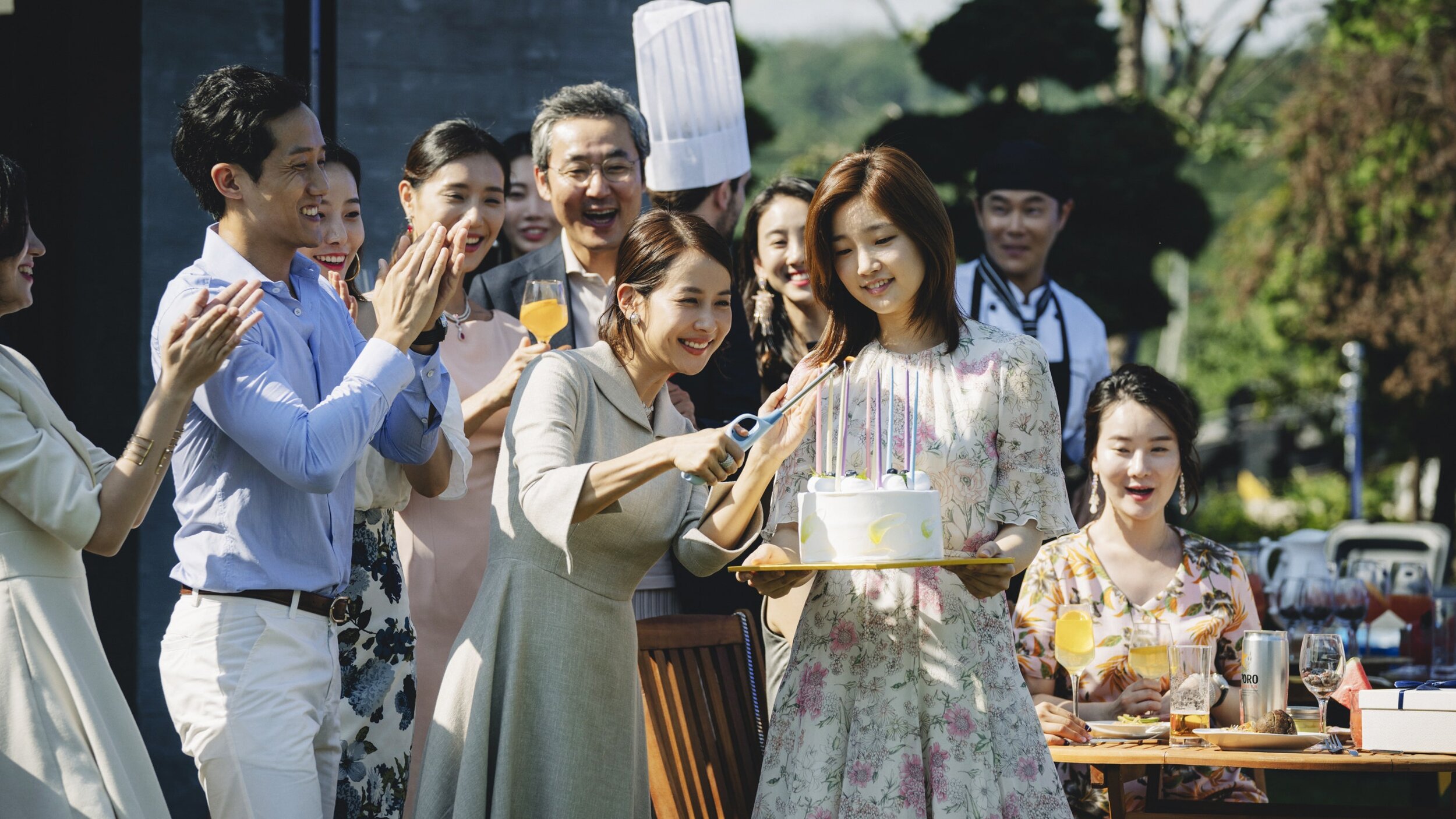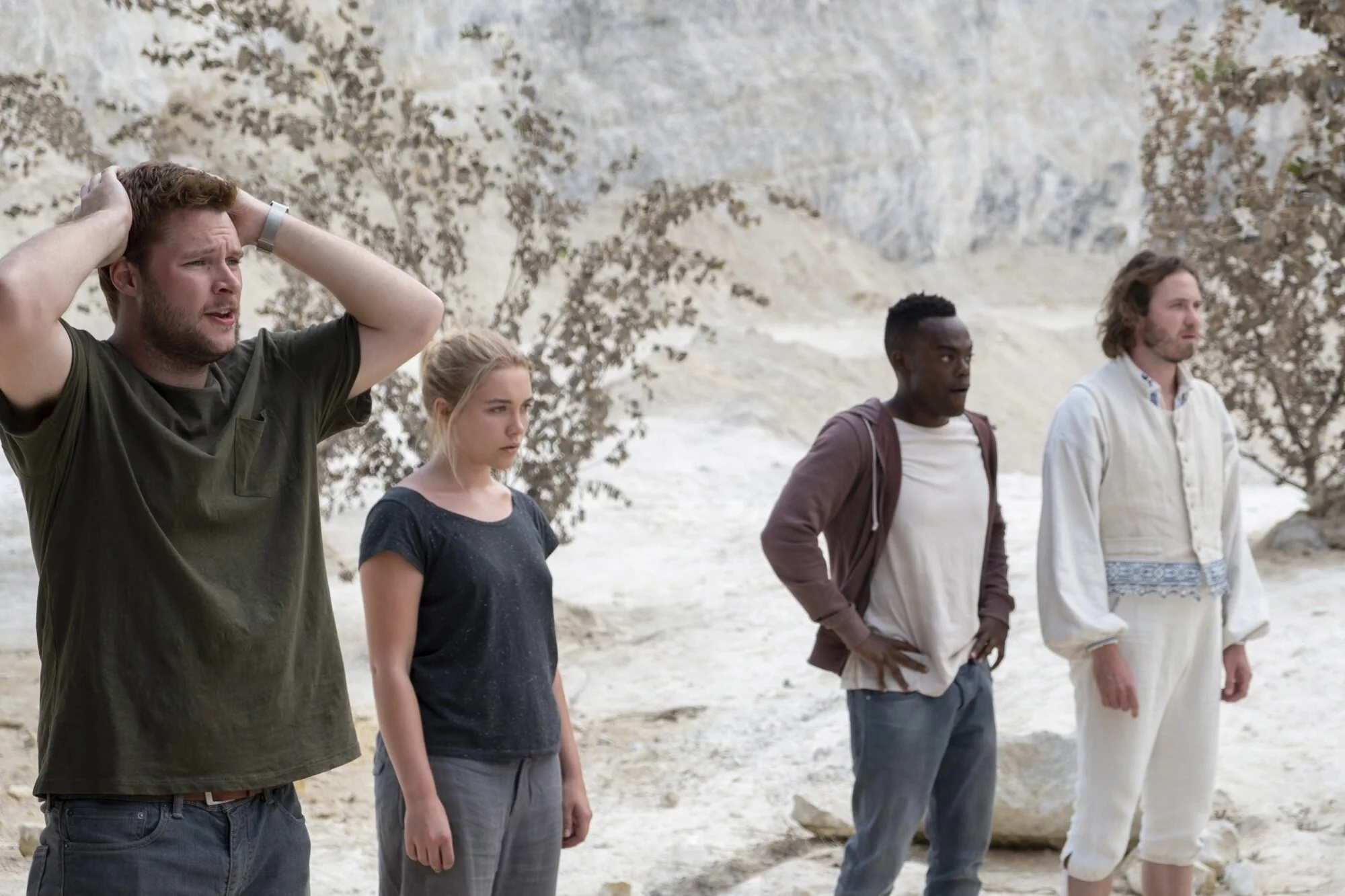Keeping Up With the Parasites
BEWARE SPOILERS
We go into every post assuming you’ve already watched the film being discussed.
Parasite (2019) is available on Hulu as of this writing (6/7/2021).
After receiving the Palme d’Or at Cannes, the South Korean director Bong Joon-Ho’s seventh film Parasite (2019) found itself at the center of universal praise. Upon being nominated for six Academy Awards, Parasite made history by becoming the first non-English language film to win Best Picture.
Despite being rooted in South Korean culture, Parasite resonates in the US because its depictions of class and economic divisions and anxieties look remarkably similar to our own.
Though it is deeply funny and smartly crafted, Parasite succeeds as a horror film in how these toxic divisions are normalized, perpetuated, and built into fear of the poor and hatred of the rich, culminating in violence. The film climaxes in tragic chaos because of the systems that dehumanize and punish lower class families, while actively preventing them from advancing toward social ideals of “success.”
And so, while Parasite takes place in internet cafes, alludes to North Korean nuclear conflict, and stuffs itself with ram-don, its social concerns feel all-too familiar to American audiences. Beneath the satirical madness of Bong’s film lies the tragic truth: the hard lines of class are nearly impossible to transcend, and attempting to cross them might leave you worse off.
“What’s Your Plan?”
The movie opens looking out from the Kim household--a cramped, subterranean “semi-basement” apartment. Through a window with small, rectangular panes, neighborhood foot traffic passes outside, all visible from the ground level. The family’s socks and underwear dry in the window, in plain view to the outside world. Before the Kims are even introduced, they’re physically positioned as lesser, below ground, behind a window evoking prison bars or a sewer grate, hard lines not to be crossed.
Panning down, we see Ki-woo (Choi Woo-shik) searching for a free wifi signal, walking with his phone held up, lamenting that the woman upstairs has password-protected her network. The camera follows him, revealing more of the Kim residence, hodgepodge and intimate. Clothes hang on an open rack in the living/kitchen/dining room; linens are stacked in desheleved mounds; the bathroom is dingy, the toilet perched on a porcelain stoop over its own sewage system. Though the house is chaotically cluttered, the lack of boundaries in their living space hints at a synergy this family will soon display in their scheme.
As Ki-woo complains of the wifi situation , Ki-jung (Park So-dam), Chung-sook (Jang Hye-jin), and Ki-taek (Song Kang-ho), the camera pans over mementos hung on the wall. A cherished piece of parchment written in Hangul. Celebratory ornaments and decorations. Medals that Chung-sook won for the hammer throw in her youth.
This sequence conveys that the Kims have lived in the lower rungs of South Korea’s class and economic structures for some time, but doesn’t present this as a tragedy. Instead, it shows the family’s tenacity to survive and make do. Though the wifi search is small stakes in scope of the film, Ki-woo, climbing uncomfortably atop the toilet pedestal to access “Coffeeland-2G” signals his willingness to do what he needs to do.
And all of this effort is to pick up a gig folding pizza boxes. Simple, disposable, mindless work. But it pays. Without consistent employment, the Kims rely on odd jobs like this to make ends meet.
These early scenes also reveal the hustling talents Ki-woo and Ki-jung have developed to compensate for their parents’ unemployment and lack of opportunities. Through conversation, we learn not only that Ki-woo served in the military and attempted to go to university, but is also a gifted speaker of English. Despite this, his attempts to find “traditional” success have failed, a circumstance echoed in his father’s speech late in the film: “If you make a plan, life never works out that way.
Ki-jung is also a gifted hustler, one who’s experience in art and computer graphics, specifically with Photoshop, become key to the Kims’ gradual movement into the Park household. Not only that, but with minimal research, Ki-jung is able to convincingly pass as an art therapist by the name of Jessica.
Ki-woo uses forged documents (Ki-jung’s handiwork) showing that his alter-ego for this con, Kevin, is a Yonsei University student. Impressed with his sister’s talents, he remarks, “God, with skills like this, why can’t you get into art school?” Even her father asks in admiration, “does Oxford have a major in document forgery? Ki-jung would be top of her class.” But despite Ki-jung’s and Ki-woo’s talents and experience--not to mention those of Chung-sook and Ki-taek, who drove Benzes “Not when I was at the designated driver service. I drove a lot of them when I was a valet,” which was after he and Chung-sook owned a fried chicken restaurant and a Taiwanese Castella shop that “went bust”--traditional upward mobility remains a myth to the Kims.
“It’s So Metaphorical”
Shortly into the film, Min, Ki-woo’s friend who’s attending college, arrives unexpectedly. While the family wears old, beat up t-shirts, gym shorts, and sweatpants, Min sports a tailored tan suit and a clean white shirt. He moves and talks with confidence. When a drunk man pisses outside the Kims’ window, the family complains but does nothing, as if it were an inevitable event, out of their control. Min, however, arriving to find the drunk mid-stream and coming from a secure background, has the confidence to confront him: “Get a fucking grip!”
Min then enters the Kim household without knocking or being invited, leaving the family embarrassed as they hide their meager dinner in a hurry.
Min thinks nothing of his intrusion. And why would he? He’s likely never been in a situation where he felt self-conscious about where he lives or his financial situation. He’s been privileged, so he’s ignorant to the experiences of those below him. Besides, he comes bearing gifts: the Gongshi (the scholar’s rock) and the tutoring opportunity.
Min explains that the Gongshi came from his grandfather and that this particular stone is “said to bring material wealth to families.” The Kims are grateful, but none more so than Ki-woo, interrupting Min to exclaim, “This is so metaphorical!” Despite the awkwardness of his friend’s sudden appearance, Ki-woo sees this stone as the good omen his family needs.
While the stone is received graciously by most of the family, Chung-sook mutters under her breath, “it’d be better if it was food.” Though played for laughs, if Min and his grandfather truly wanted to help, then food or money would have been far more welcome.
As Min outlines his tutoring proposal, Ki-woo is taken aback. He asks, “What about your university friends? Why ask a loser like me?” Min responds with cruel honesty masked as a kind of praise:
Why do you think? Just the thought makes me sick. Those disgusting frat boys slavering over Da-hye (Ji-so Jung)? It's revolting… When she enters university, I’ll officially ask her out. So you take care of her until then. If it's you, I can leave in peace.
Though Ki-woo seems to take this as a compliment and an expression of their friendship, it seems more like Min doesn’t view him as a threat: why would the wealthy and beautiful Da-hye ever leave him for the poor and demure Ki-woo? (The joke’s on him when Ki-woo slavers over and starts a relationship with Da-hye later in the film.)
“If I Had All This Money, I Would Be Nice, too!”
The world Ki-woo encounters when he interviews for the tutoring job is both alien and exciting. On the other side of town, the complex is fortified with concrete walls. From the street, the house beyond the barrier is effectively invisible, all to keep the outside from coming in.
Unlike Min, Ki-woo must ring the doorbell, waiting for permission to enter. Even then, he’s not greeted in person or by a member of the Park family, but by their housekeeper Moon-gwang (Lee Jung-eun) through the video doorbell. The Parks separate themselves from the rest of the city and from the larger world. To be within these walls is an exclusive privilege.
The house itself is a marvel, its own little utopia, with a lush and expansive yard, like a forest glen. Though an impressive demonstration of the Parks’ wealth, the house feels empty and impersonal, especially compared to the way the Kims’ lives sprawl out over their tiny semi-basement. Aside from a stray toy arrow, nothing is out of place. The family room has a massive couch and a picturesque view of the yard, but feels hollow, like a model home. Even the images found on the walls feel cold and detached. Both the Parks’ wedding and family portraits are set against black backgrounds--a clean, efficient aesthetic, that feels counter to the intimacies of family life.
Next to these photos are two measures of Dong-ik’s (Lee Sun-kyun) professional success--a framed newspaper article, “Nathan Park Hits Central Park,” and an award for his “Best Use of Emerging/New Technology Award.” The family treats Dong-ik’s career milestones as if they were family photos.
The Park matriarch, Yeon-gyo (Cho Yeo-jeong), is far more involved in stories about her children, but she’s oblivious to their needs. When Ki-woo finds her passed out in the backyard, she tells him they were happy with Min’s previous work, “regardless of her grades.” A hilarious line that lays clear, Yeon-gyo had no idea of Min and Da-hye’s relationship.
Their youngest, Da-song (Jung Hyun-jun), is currently fixated on Native Americans, his room decked out with imported garb and paraphernalia. Throughout the bedroom sit mock headdresses, bows with suction cup arrows, and, standing in the center, a massive tipi in which he sleeps. Yeon-gyo doesn’t quite understand his fascination with “the American Indian,” but seems content to fuel her son’s adoption of their culture as playthings and empty decoration.
With Ki-woo’s successful infiltration as Da-hye’s English tutor, the rest of the Kim clan latch onto the Parks’ lives. Ki-jung, using her experience and minimal research, secures a position as an art therapist treating the trauma she says Da-song expresses through art. Ki-taek and Chung-sook use their own backgrounds as a driver and a caretaker, respectively, after driving out the Parks’ previous employees.
Though the Kims’ schemes are well-planned, the firings of driver Yoon (Park Keun-rok) and housekeeper Moon-gwang also reveal how commodified the Parks view their employees. When Dong-ik finds the panties Ki-jung planted in the back of the car, they are quick to villainize the driver and even to question the “mental state” of his mystery date, anticipating that they might find meth or coke in the car next, at which Yeon-gyo panics: “What do we do? If they find some kind of white powder in your car, we’re all doomed!” They decide to fire the driver without explanation beyond “some kind of bland, harmless reason. Let him go quietly. Don’t even mention the panties. Or the intercourse.” All this to avoid dirtying the Park name by having it “linked with his disgusting behavior.”
After the Kims masterfully frame Moon-gwang, Dong-ik laments the loss, praising her qualities as a housekeeper, noting particularly that she “knew to never cross the line. I can’t stand when people cross the line.” He speaks from authority here, asserting the roles of employer and employee and the lines of class. What he admired most about Moon-gwang was that she knew her place as a member of the working class, and would never try to be anything higher, certainly never Dong-ik’s equal.
In this same conversation, Dong-ik also acknowledges how little he cares for his wife. He complains that she’s terrible at cleaning, a bad cook, and, when Ki-taek asks whether he loves her, he laughs dramatically: “Of course. I love her. We’ll call it love.” Taken alongside his air of detached formality, the line suggests Dong-ik doesn’t have much in the way of respect for his wife. He doesn’t hate Yeon-gyo, but he objectifies her, keeping their relationship at a distance, keeping her as, essentially, a trophy wife.
As these two families become intertwined, their differences become increasingly stark. The visuals and interactions demonstrate how disparate their day-to-day experiences are, but also contrast how they understand the idea of family. The wealth, power, and privilege of the Parks allows them to live comfortably and without worry, but at the cost of human relationships. While the lives and machinations of the Kims bleed together, each helping the other in their efforts, the Parks might as well be on their own planets. Their positions at the top have made them complacent, self-involved, oblivious--perfect marks for the Kims’ patchwork of cons.
“RESPECT!”
The major twist of Parasite comes as Moon-gwang returns to the house while the Parks are gone. She’s come to retrieve “something” she’d left behind, which turns out to be her husband, Guen-sae (Park Myung-hoon). Together, they reveal that he’s been living in a secret basement since the Parks moved in four years ago.
With this newfound knowledge comes the ironic realization of the homeowners’ incredible ignorance. Despite all their security, the hard lines drawn to keep the outside world at bay, a poor man lived hidden beneath them, sending messages in Morse code to the oblivious Mr. Park
It’s this fear of the outside, of the haves losing their wealth to the have-nots that Parasite examines in this depiction of class warfare. In a society that has warmly embraced the tenets of capitalism and “American opportunity,” success comes with a nasty asterisk. In order for one to succeed, another must suffer. Life becomes a competition, the Korean version of “keeping up with the Joneses.”
In the case of the Kims and the Parks and now Moon-gwang and Guen-sae, cutthroat violence manifests as the have-nots vie, not against the haves, but against each other for any opportunity to move up.
The two stowaways and the Kims now find themselves in a terrible conflict with no chance of compromise. Through deception, they have both found opportunities to feed off of the Parks. With their secrets revealed, each party’s existence threatens the other, unravelling all their well-laid plans. Both families, then, are reduced to crabs in a bucket.
It is here that Parasite becomes most like a horror film, engaging in the physical violence and tension that we tend to expect from the genre. The Kims and the dwellers scramble over each other, grasping for a phone’s incriminating evidence. Fists are thrown, hair is grabbed, throats are choked. In a particularly humorous and disturbing moment, Ki-jung throws a plastic bag of peaches over Moon-gwang’s head, triggering a violently allergic reaction. If there’s a moment in this struggle that conveys more desperation, I don’t know what it is.
As the Kims hold over the basement dwellers, the Parks announce their imminent return to the house. Panic ensues. Guen-sae and the dying Moon-gwang are forced back into their dungeon. The Kim clan, after much anguish, shame, and belittlement, return to their flooded apartment with their tails between their legs.
“No Plan At All”
In wake of this conflict, the Kims return, fatigued, to the Park house for Da-song’s “impromptu birthday party.” They’re each tasked in making the extravagant day a success, but the efforts are significantly more taxing and strained than before. Ki-taek especially appears crushed as he chauffeurs Yeon-gyu around for hor d'oeuvres and wine. He responds bluntly and without enthusiasm when Dong-ik equips him with a headdress and tomahawk, commanding him in an insensitive birthday charade. Ki-taek understands all too well where he now stands.
Ki-woo, hoping to save his family, descends into the basement with his metaphorical rock, intent on finishing off Moon-gwang and Guen-sae. Ill-fitted for murder as he is, he flubs when the rock slips out of his fingers and tumbles down the stairs. Guen-sae sneaks up on the young man, trapping him before striking Ki-woo with the rock in the head.
And he could not be undone by a more appropriate symbol--the dreams and aspirations for his family. As their ruse comes crashing down, the Kims’ eyes now open to the shame of their disposability, so too does the rock upon Ki-woo’s head, permanently damaging him and his perspective on their time with the Parks.
Guen-sae emerges from the basement, sending the party into pandemonium as he attacks the guests. Chung-sook kills him, but not before he stabs Ki-jung through the heart and the sight of his face sends Da-song into a seizure.
Dong-ik, panicked over his son, delivers one last insult to the Kims--berating Ki-taek for trying to give medical attention to the dying Ki-jung, rather than drive him and his son from the scene, he plugs his nose as he searches Guen-sae for the car keys Ki-taek failed to throw to him. Ki-taek then surprises everyone by plunging a butcher's knife into Dong-ik’s chest. He flees the scene, disappearing without a trace.
When Ki-woo wakes from his coma and discovers his father’s inaccessible hiding place, he writes a letter, detailing a plan to attend university, get a great job, and buy the Park house, allowing his father to emerge from his purgatory. But the film leaves Ki-woo’s plan a fantasy, setting us back in their underground apartment, ending where the film began, as snow falls silently outside. The window still evokes a prison. And a sewer grate. Ki-woo whispers to his father, “So long.”













